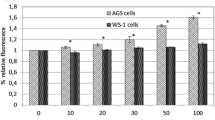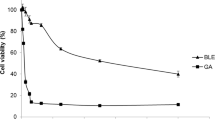Abstract
Background
Oleuropein (OLE), the main phenolic compound of the olive fruit and leaves, has many heathful effects. Gastric cancer is the most fatal malignancy in many parts of the world and it is generally related to harmful dietetic factors. The anticarcinogenic role of OLE in gastric cancer has not been studied sufficiently yet. In this study, we aimed to research the cytotoxic, genotoxic and apoptotic effects of OLE on gastric adenocancer (AGS) cells in vitro.
Methods and Results
A standard cell line derived from gastric adeno cancer (AGS) cells was employed, and its performance following a 24-hour exposure to OLE at various doses was examined. The ATP cell viability assay, 2’,7’-dichlorodihydrofluorescein-diacetate assay (H2DCF-DA) and alkaline single cell gel electrophoresis assay (Comet Assay) were used to study the cytotoxicity, production of reactive oxygen species (ROS) and genotoxicity respectively. The induction of apoptosis was discovered using flow cytometry. OLE reduced AGS cells viability about 60% at maximum concentration (500 µmol/L) and also resulted in approximately 100% DNA damage and about 40% apoptosis with necrosis in AGS cells depending on the increased doses. Cell viability was also significantly decreased in relation to increased intracellular reactive oxygen species (ROS) levels (p < 0.05 − 0.001).
Conclusions
Oleuropein has shown significant anticarcinogen effects against gastric adenocancer (AGS) cells in vitro. Oleuropein, a nutrient rich in olive and olive oil, seems to be both protective and therapeutic against gastric cancer and may be a new chemotherapeutic agent in the future.






Similar content being viewed by others
Data availability
The datasets generated during and/or analysed during the current study are available from the corresponding author on reasonable request.
References
Nediani C, Ruzzolini J, Romani A, Calorini L (2019) Oleuropein, a bioactive compound from Olea europaea L., as a potential preventive and therapeutic agent in non-communicable diseases. Antioxidants 8(12):578. https://doi.org/10.3390/antiox8120578
Zheng Y, Liu Z, Yang X, Liu L, Ahn KS (2021) An updated review on the potential antineoplastic actions of oleuropein. Phytother Res 36(1):365–379. https://doi.org/10.1002/ptr.7325
Antoniou C, Hull J (2021) The anti-cancer effect of Olea europaea L. products: a review. Curr Nutr Rep 10:99–124. https://doi.org/10.1007/s13668-021-00350-8
Fabiani R, Rosignoli P, De Bartolomeo A, Fuccelli R, Morozzi G (2008) Inhibition of cell cycle progression by hydroxytyrosol is associated with upregulation of cyclin-dependent protein kinase inhibitors p21(WAF1/Cip1) and p27(Kip1) and with induction of differentiation in HL60 cells. J Nutr 138(1):42–48. https://doi.org/10.1093/jn/138.1.42
Rizzo M, Ventrice D, Giannetto F, Cirinnà S, Santagati NA, Procopio A et al (2017) Antioxidant activity of oleuropein and semisynthetic acetylderivatives determined by measuring malondialdehyde in rat brain. J Pharm Pharmacol 69(11):1502–1512. https://doi.org/10.1111/jphp.12807
Geyikoglu F, Isikgoz H, Onalan H, Colak S, Cerig S, Bakir M et al (2017) Impact of high-dose oleuropein on cisplatin-induced oxidative stress, genotoxicity and pathological changes in rat stomach and lung. J Asian Nat Prod Res 19(12):1214–1231. https://doi.org/10.1080/10286020.2017
Türkdoğan MK, Akman N, Tuncer I, Uygan I, Kösem M, Özen S, Kara K, Bozkurt S, Memik F (2005) Epidemiological aspects of endemic upper gastrointestinal cancers in Eastern Turkey. Hepatogastroenterology 52(62):496–500.
Ilic M, Ilic I (2022) Epidemiology of stomach cancer. World J Gastroenterol 28(12):1187–1203. https://doi.org/10.3748/wjg.v28.i12.1187
Singh NP, McCoy MT, Tice RR, Schneider EL (1988) A simple technique for quantitation of low levels of DNA damage in individual cells. Exp Cell Res 175(1):184–191. https://doi.org/10.1016/0014-4827(88)90265-0
Hartmann A, Agurell E, Beevers C, Brendler-Schwaab S, Burlinson B, Clay P et al (2003) Recommendations for conducting the in vivo alkaline Comet assay. Mutagenesis 18(1):45–51. https://doi.org/10.1093/mutage/18.1.45
Psaltopoulou T, Kosti RI, Haidopoulos D, Dimopoulos M, Panagiotakos DB (2011) Olive oil intake is inversely related to cancer prevalence: a systematic review and a meta-analysis of 13800 patients and 23340 controls in 19 observational studies. Lipids Health Dis 10(1):1–16. https://doi.org/10.1186/1476-511X-10-127
Buiatti E, Palli D, Decarli A, Amadori D, Avellini C, Bianchi S et al (1990) A case-control study of gastric cancer and diet in Italy: II. Association with nutrients. Int J Cancer 45:896–901. https://doi.org/10.1002/ijc.2910440409
Palli D, Russo A, Ottini L, Masala G, Saieva C, Amorosi A et al (2001) Red meat, family history, and increased risk of gastric cancer with microsatellite instability. Cancer Res 61(14):5415–5419.
Stoneham M, Goldacre M, Seagroatt V, Gill L (2000) Olive oil, diet and colorectal cancer: an ecological study and a hypothesis. J Epidemiol Community Health 54(10):756–760. https://doi.org/10.1136/jech.54.10.756
Ahmad Farooqi A, Fayyaz S, Silva AS, Sureda A, Nabavi SF, Mocan A et al (2017) Oleuropein and cancer chemoprevention: the link is hot. Molecules 22(5):705. https://doi.org/10.3390/molecules22050705
Imran M, Nadeem M, Gilani SA, Khan S, Sajid MW, Amir RM (2018) Antitumor perspectives of oleuropein and its metabolite hydroxytyrosol: recent updates. J Food Sci 83(7):1781–1791. https://doi.org/10.1111/1750-3841.14198
Khan M, Maryam A, Qazi JI, Ma T (2017) Olive Oil: an Angel of Protection Against Cancer. Adv Cancer Diet : 1–57.
Galeone C, Talamini R, Levi F, Pelucchi C, Negri E, Giacosa A et al (2007) Fried foods, olive oil and colorectal cancer. Ann Oncol 18(1):36–39. https://doi.org/10.1093/annonc/mdl328
Gill CI, Boyd A, McDermott E, McCann M, Servili M, Selvaggini R et al (2005) Potential anti-cancer effects of virgin olive oil phenolson colorectal carcinogenesis models in vitro. Int J Cancer 117(1):1–7. https://doi.org/10.1002/ijc.21083
Llor X, Pons E, Roca A, Alvarez M, Mane J, Fernandez-Banares F et al (2003) The effects of fish oil, olive oil, oleic acid and linoleic acid on colorectal neoplastic processes. Clin Nutr 22(1):71–79. https://doi.org/10.1054/clnu.2002.0627
Giner E, Recio MC, Ríos JL, Cerdá-Nicolás JM, Giner RM (2016) Chemopreventive effect of oleuropein in colitis‐associated colorectal cancer in c57bl/6 mice. Mol Nutr Food Res 60(2):242–255. https://doi.org/10.1002/mnfr.201500605
Cheng JS, Chou CT, Liu YY, Sun WC, Shieh P, Kuo,D.H., et al (2016) The effect of oleuropein from olive leaf (Olea europaea) extract on Ca2 + homeostasis, cytotoxicity, cell cycle distribution and ROS signaling in HepG2 human hepatoma cells. Food Chem Toxicol 91:151–166. https://doi.org/10.1016/j.fct.2016.03.015
Yan CM, Chai EQ, Cai HY, Miao GY, Ma W (2015) Oleuropein induces apoptosis via activation of caspases and suppression of phosphatidylinositol 3-kinase/protein kinase B pathway in HepG2 human hepatoma cell line. Mol Med Rep 11(6):4617–4624. https://doi.org/10.3892/mmr.2015.3266
Goldsmith CD, Bond DR, Jankowski H, Weidenhofer J, Stathopoulos CE, Roach PD et al (2018) The olive biophenols oleuropein and hydroxytyrosol selectively reduce proliferation, influence the cell cycle, and induce apoptosis in pancreatic cancer cells. Int J M Olecular Sci 19(7):1937–1953. https://doi.org/10.3390/ijms19071937
Acquaviva R, Di Giacomo C, Sorrenti V, Galvano F, Santangelo R, Cardile V et al (2012) Antiproliferative effect of oleuropein in prostate cell lines. Int J Oncol 41(1):31–38. https://doi.org/10.3892/ijo.2012
Samara P, Christoforidou N, Lemus C, Argyropoulou A, Ioannou K, Vougogiannopoulou K et al (2017) New semi-synthetic analogs of oleuropein show improved anticancer activity in vitro and in vivo. Eur J Med Chem 137:11–29. https://doi.org/10.1016/j.ejmech.2017.05.029
Hamdi HK, Castellon R (2005) Oleuropein, a non-toxic olive iridoid, is an anti-tumor agent and cytoskeleton disruptor. Biochem Biophys Res Commun 334(3):769–778. https://doi.org/10.1016/j.bbrc.2005.06.161
Barzegar F, Zaefizadeh M, Yari R, Salehzadeh A (2019) Synthesis of nano-paramagnetic oleuropein to induce KRAS over-expression: a new mechanism to inhibit AGS cancer cells. Medicina 55(7):388. https://doi.org/10.3390/medicina55070388
Antognelli C, Frosini R, Santolla MF, Peirce MJ, Talesa VN (2019) Oleuropein-induced apoptosis is mediated by mitochondrial glyoxalase 2 in NSCLC A549 cells: a mechanistic inside and a possible novel nonenzymatic role for an ancient enzyme. Oxidative medicine and cellular longevity. 1–10. https://doi.org/10.1155/2019/8576961
Liu L, Ahn KS, Shanmugam MK, Wang H, Shen H, Arfuso F et al (2019) Oleuropein induces apoptosis via abrogating NF-κB activation cascade in estrogen receptor–negative breast cancer cells. J Cell Biochem 120(3):4504–4513. https://doi.org/10.1002/jcb.27738
Funding
This work was supported by the Bezmialem Vakif University Faculty of Medicine Scientific Research Project Fund (project number: 3.2014/35).
Author information
Authors and Affiliations
Contributions
M.Kürşad Türkdoğan and Abdürrahim Koçyiğit contributed to the study conception and design. Material preparation and data collection were performed by Abdürrahim Koçyiğit, Eray Metin Güler. Data analysis were performed by M.Kürşad Türkdoğan, Abdürrahim Koçyiğit. The first draft of the manuscript was written by M. Kürşad Türkdoğan and all authors commented on previous versions of the manuscript. All authors read and approved the final manuscript.
Corresponding author
Ethics declarations
Competing interests
“The authors have no relevant financial or non-financial interests to disclose.”
Ethics approval
This study was performed in line with the principles of the Declaration of Helsinki. No ethical approval is required since this is a cell culture study.
Additional information
Publisher’s Note
Springer Nature remains neutral with regard to jurisdictional claims in published maps and institutional affiliations.
Rights and permissions
Springer Nature or its licensor (e.g. a society or other partner) holds exclusive rights to this article under a publishing agreement with the author(s) or other rightsholder(s); author self-archiving of the accepted manuscript version of this article is solely governed by the terms of such publishing agreement and applicable law.
About this article
Cite this article
Türkdoğan, M.K., Koçyiğit, A., Güler, E.M. et al. Oleuropein exhibits anticarcinogen effects against gastric cancer cell lines. Mol Biol Rep 50, 9099–9105 (2023). https://doi.org/10.1007/s11033-023-08773-y
Received:
Accepted:
Published:
Issue Date:
DOI: https://doi.org/10.1007/s11033-023-08773-y




